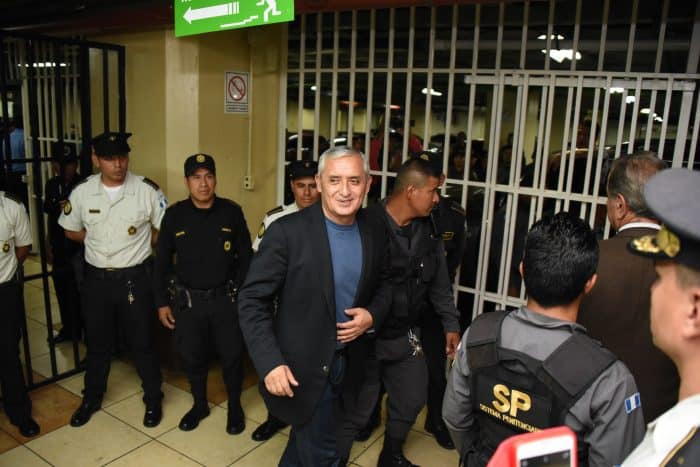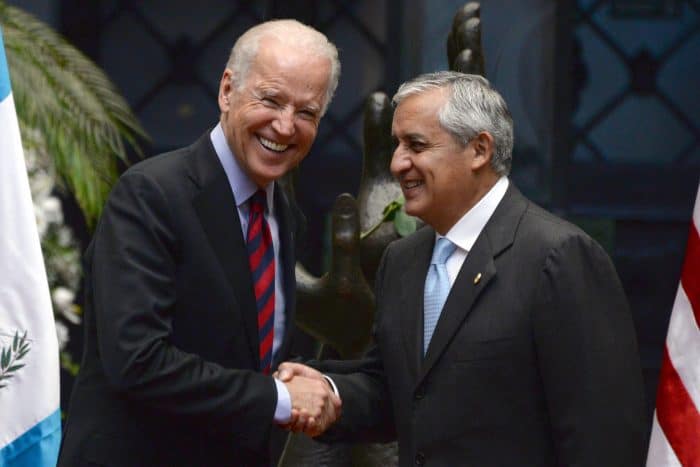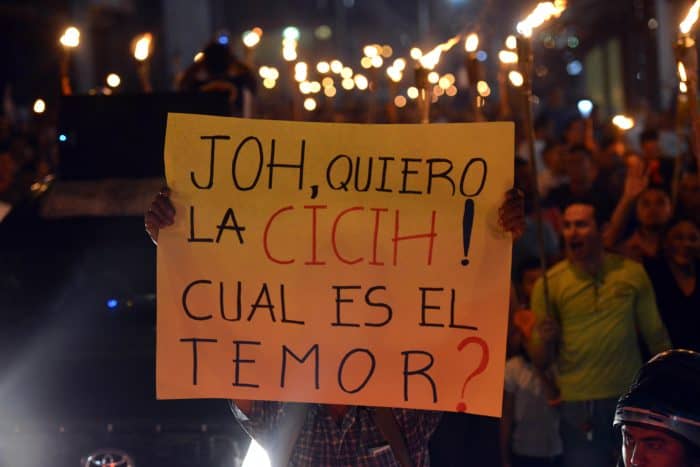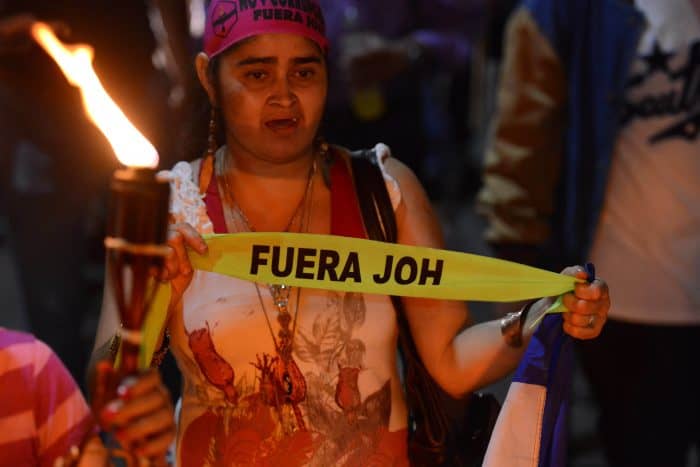GUATEMALA CITY – In an exclusive interview with CNN en Español, Guatemala’s former President Otto Pérez Molina, who was charged with corruption Tuesday and is currently held in preventive prison pending trial, said efforts to prosecute him are part of a U.S. conspiracy against him.
After an investigation conducted by the U.N.-supported International Commission Against Impunity in Guatemala (CICIG) revealed Pérez Molina and former Vice President Roxana Baldetti allegedly masterminded a huge customs fraud network, he was stripped of his prosecutorial immunity, forced to resign, and charged with customs fraud, illicit association and bribery.
Speaking from the Matamoros army barracks in Guatemala City where he is currently being held, Pérez Molina told CNN en Español’s Fernando del Rincón that he is innocent of any wrongdoing and that the U.S. government used CICIG to oust him from power and further its geopolitical interests in the region.
“It is not only what you saw in the hearing. There is a series of interests of another type, I would say including geopolitical interests, not only in Guatemala, but extending to Honduras and El Salvador,” he said.
According to the disgraced former president, the U.S. had “a clear interest” in securing the renewal of CICIG’s mandate in Guatemala, which was due to expire in September, so that similar commissions could be created in Honduras and El Salvador.
“When I traveled to Washington last year, the U.S. Secretary of State called me and said that the vice president [Joe Biden] wanted to speak to me. He stayed behind with me and said it was important for CICIG’s mandate to be renewed. I told him that we were analyzing the issue in order to make that decision,” Pérez Molina said.
Alluding to Biden’s visit to Guatemala last March, he added: “Vice President Biden came to Guatemala and had included a visit to CICIG’s headquarters in his itinerary. I said, ‘Look, speak to the ambassador because we’re discussing this and it’s a domestic matter,’ and the fact that he should decide to visit the commission’s headquarters and the commissioner amounts to forcing us to say that we want CICIG to remain in the country. In the end, the visit [to CICIG’s headquarters] was suspended, but the head of CICIG was invited to the embassy and had a meeting with him [Biden]. After that, he [Biden] attended an official event in which he told the press that CICIG had to remain in the country, and that was an imposition.”

According to Pérez Molina, the U.S. forced his government to accept the renewal of CICIG’s mandate with the aim of paving the way for similar commissions to be created in neighboring countries.
“They even asked me to speak to the presidents of those countries,” Pérez Molina told CNN. “Then they [the U.S.] came up with the Plan for the Alliance for Prosperity in the Northern Triangle and started to impose conditions. They said that [renewing CICIG’s mandate] would be decisive [for the plan to go ahead].”
In contrast to his appearances in court this week in which he wore a dark blue suit, shirt and tie and stood stiff and upright when addressing the press, Pérez Molina appeared relaxed and wore dark blue jeans and a T-shirt for the interview filmed in the yard of the Matamoros army barracks.

Playing the conspiracy card
Pérez Molina’s statements are consistent with a pre-recorded televised address to the nation two days after prosecutors presented incriminating evidence of his involvement in “La Línea” on Aug. 21, in which he lashed out against CICIG by making oblique references to “an interventionist strategy that seeks to make political decisions in this country.”
Political analyst Edgar Gutiérrez dismissed Pérez Molina’s statements as a desperate attempt to curry favor with Guatemalan conservatives such as the powerful private business sector lobby, CACIF, which had opposed CICIG’s presence in the country but reversed course once Pérez Molina’s case gained traction.
“There’s no substance to his allegations,” Gutiérrez told The Tico Times. “CICIG’s findings are there for everyone to see, and its work is judicial, not political.”
Gutiérrez added that Pérez Molina might be seeking sympathy from political leaders in neighboring countries, such as Honduras, where civil society groups are calling for the creation of CICIH – Honduras’ own version of Guatemala’s CICIG.

Images of Guatemala’s massive #RenunciaYa (#ResignNow) demonstrations circulated on social media and broadcast on Honduran television inspired Hondurans to take to the streets after the attorney general revealed that a network led by a former social security board director defrauded the government of some $120 million from 2010 to 2014. According to prosecutors, some of the funds were used to boost the ruling party’s coffers during the 2013 presidential campaign.
Honduran President Juan Orlando Hernández has admitted his campaign received embezzled funds but refuses to step down and adamantly rejects the creation of a CICIH. Instead, he proposes the creation of an anti-corruption commission that likely would lack prosecutorial independence.

Honduran political analyst Tomás Andino told The Tico Times it would be wrong to assume the U.S. regards CICIG as a one-size-fits-all solution for Central America, and the U.S. appears to be against the idea of replicating the CICIG model in Honduras, a more volatile country with higher levels of violence that is still reeling from the effects of a U.S.-supported coup that ousted President Manuel Zelaya in 2009.
Whereas Guatemala’s protests have been notably peaceful, a scandal of the size of “La Línea” could easily lead a country like Honduras to erupt into violence and could usher in the return of Zelaya loyalists, Andino said.
“The Indignados movement demands the creation of CICIH, but the U.S. Embassy has decided to side with the Honduran government and seeks to maintain the status quo,” he said. “At first I thought the U.S. government would be coherent with the stance it has taken in Guatemala, but recent events have shown this will not be the case.”
Andino added that “ousting Hernández, who has sided with U.S. interests, would generate instability and allow the opposition to return to power.”
Baldetti sent to Guatemala hospital
On Friday, former Vice President Roxana Baldetti, who is being held in the Santa Teresa women’s prison pending trial for her involvement in “La Línea,” was taken to the Military Hospital in Guatemala City’s Zone 16 to undergo a medical checkup. Her defense attorneys requested the transfer.
This is not the first time Baldetti has become “ill.” On Aug. 21 she was arrested at the Centro Médico private hospital where she had checked in claiming she was suffering from a gastrointestinal infection and required an endoscopy procedure.
However, Roberto Garza, a spokesman for the National Institute of Forensic Science, said previous medical checkups had established that it was unnecessary for her to be sent to hospital and that she could easily be examined by a doctor at the Santa Teresa prison.
Estado de salud de Baldetti es crítico y continúa en Hospital Militar. http://t.co/tKPNsgwgKs pic.twitter.com/PfUZh1qkm5
— Prensa Libre (@prensa_libre) September 12, 2015
A section of the prison’s administrative headquarters has been used to accommodate Baldetti so that she has no contact with other prisoners. Photographs published by the Guatemalan press show that unlike ordinary inmates, Baldetti’s living quarters include a living room and private bathroom, which has angered many Guatemalans who believe she should not be granted such privileges.
No me había dado cuenta en que lujo de carcel esta baldetti. Que descaro! Ahí si hacen rápido las cosas verdad. pic.twitter.com/shfHdiUVPA
— CaballeroRandom4.0 (@mslcasanova) September 5, 2015





